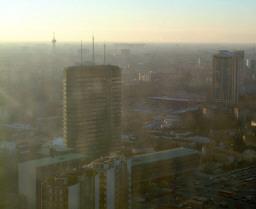Long-term exposure to air pollution could be partly to blame for deep-vein thrombosis, according to a new Italian study.
The research, led by Dr Andrea Baccarelli, suggests that air laden with tiny particles of pollution produced by vehicle exhaust and industry fumes greatly boosts the chances of developing blood clots in the legs.
While numerous studies have linked air pollution to heart attacks and strokes, this is the first evidence of a connection to deep vein thrombosis.
Baccarelli, who led the study while at the Harvard School of Public Health in Boston, looked at the effects of fine particles smaller than 10 micrometers in diameter (PM10), which are able to enter human lungs through the nose and mouth.
The research measured the exposure to such pollution of 870 people living in the northwest Italian region of Lombardy, who had developed deep vein thrombosis between 1995 and 2005.
They then tested 1210 healthy individuals living in other parts of the region, assessing the concentration of fine-particle air pollution in their area of residence.
The researchers discovered individuals were 70% more likely to develop deep-vein thrombosis for every additional year of exposure to 10 micrograms per square metre of particulate matter.
The tests also revealed that the more people were exposed to this kind of pollution, the faster they developed blood clots.
''Given the magnitude of the observed effects and the widespread diffusion of particulate pollutants, our findings introduce a novel and common risk factor into the pathogenesis of deep-vein thrombosis,'' concluded the authors of the study, writing in the Archives of Internal Medicine, a bimonthly international medical journal.
''At the same time, [they] give further substance to the call for tighter standards and continued efforts aimed at reducing the impact of urban air pollutants on human health''.
A number of other risk factors have already been linked to deep-vein thrombosis, such as obesity, recent surgery, use of the contraceptive poll and air travel, resulting in its alternative name of ''economy class syndrome''
PM10, which can be particles of carbon, nitrates or other substances, has been linked to a variety of health problems in recent years, including chronic asthma, heart disease and lung cancer.
In Italy, around 8,000 deaths annually are attributed to disease linked to fine-particle air pollution.









